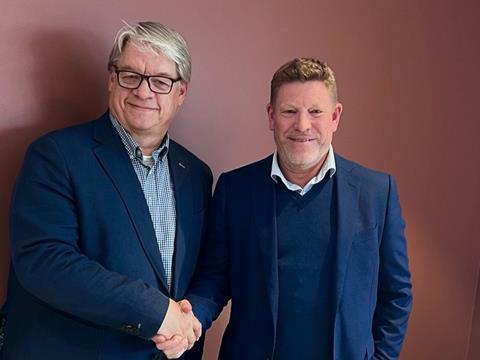
A partnership between Plast Nordic and Norner aims to use alkaline hydrolysis to recycle 97% of PET waste generated in the Nordics back into their raw materials, targeting the packaging and textile industries with their ‘virgin-quality’ rPET resin.
Over 400,000 tons of PET waste is currently thought to exist in the Nordic region, while exports are thought to result in ‘significant’ energy loss and ‘irrational management of substantial value’.
Now the partners intend to recycle approximately 97% of the waste back into their raw materials, with advanced recycling thought to be the ‘only’ technology to achieve circularity without sacrificing the quality of the recyclate. In turn, it is set to increase access to recycled materials, reduce transportation, and create new jobs.
Plast Nordic will utilize alkaline hydrolysis technology, alongside patented microwave technology from Switzerland, to recycle both plastic and textiles. It is said to offer resilience against waste impurities (up to 30% impurities without affecting quality).
The process is reportedly chemical-free, instead making use of microwaves, and Plast Nordic explains that the process takes under 10 minutes to complete. The reactor is set to run continuously rather than in batches, handling both plastic and polyester textiles; this is expected to result in virgin-quality recycled PET resin.
With the technology geared towards the plastic packaging and polyester textile streams, among others, several Nordic brands are already said to have shown ‘significant interest’ in purchasing the recycled products.
“Plast Nordic has the potential to significantly increase sustainability in the plastics and textile industry,” says Kjetil Larsen, PhD, CEO at Norner. “However, the company needs more specialized expertise.
“Norner has the capacity to contribute with business strategy, polymer science, and production technical assessments, which in turn increases the realization ability of this large and important industrial project.”
A Memorandum of Understanding has outlined a strategy in which the companies will jointly contribute to Plast Nordic’s strategic and commercial objectives, with the company emphasizing its involvement in industrial preparations for Nordic chemical recycling facilities since 2019.
Additionally, Dr. Marianna Sarkissova has become a strategic partner to Plast Nordic, offering her expertise in planning and executing international industrial projects – as well as her access to capital and an international network.
“We aim to contribute to scalable industrial projects where sustainability and business models are well-balanced,” continues Dr. Marianna Sarkisova, PhD, MBA. “The combination of chemical recycling of PET, Norner’s capacity, Plast Nordic’s position, and focus on the well-organized Nordic region is appealing to us. We will provide everything needed for successful realisation of this breakthrough opportunity.”
“While thorough preparation and access to unique technology are a promising start for such a significant industrial project, having the right industrial partners who understand the sector’s complexity and dynamics, and who can contribute R&D capacity, networks, and capital, is crucial,” says Rune Byremo, project manager at Plast Nordic. “This is now being realized.”
Plast Nordic is in the process of identifying a suitable location for its first factory in Norway or Denmark, factoring in the necessary access to renewable energy, scalability for gross, access to surplus heat for thermal energy, and logistical capacities. The aim is to open a facility in the Nordic region by 2028.
A demonstration plant currently exists in Italy, and the first full-scale factory of this kind is expected to open in Spain in 2027.
In another strategic partnership, Coveris and Interzero intend to combine the operations of a packaging producer, a circular economy service provider, and a specialist in sorting and plastics recycling – converting plastic waste into resins to be used in further packaging products. In doing so, they plan to secure raw materials, reduce the CO2 footprint of the resultant plastics, and align with upcoming sustainability regulations.
Trinseo has also opened a polymethyl methacrylate depolymerization facility in Italy. Acrylic solutions are returned to the constituent monomer, methyl methacrylate, removing contaminants and enabling acrylics to be recycled.
Additionally, a joint Letter of Intent between Zhink Group and Carbios is set to result in a Chinese bio-recycling plant for the latter’s enzymatic depolymerization technology. The companies have set a target to process 50,000 tons of prepared PET waste annually and distribute enzymatically recycled rPET throughout Asia.
In our latest edition of The Brief, we examined the Nordic Co-operation’s in-depth investigation into disposable versus washable food and e-commerce packaging in the Nordic region, intending to answer the question of which has the smaller environmental impact.
If you liked this story, you might also enjoy:
How are the top brands progressing on packaging sustainability?
Sustainable Innovation Report 2024: Current trends and future priorities
Reuse vs. single use – which is better for the environment?
The ultimate guide to global plastic sustainability regulation














No comments yet